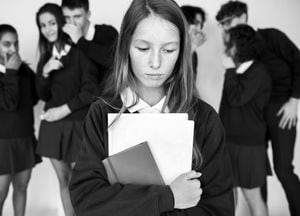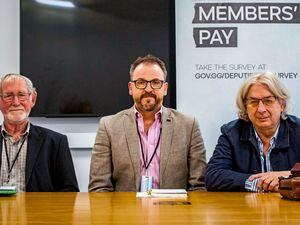OPINION: Education’s canary moment
Shock headlines about bullying at school reveal even deeper issues at the heart of education in Guernsey, according to a Young People’s survey. The other bad news for island learners, says Richard Digard is that no one’s running the classroom.

FOR reasons I don’t need to go into now, please take it from me that if you use official facts and statistics and produce conclusions from them that don’t suit States of Guernsey groupthink, you risk an immediate and usually unhelpful pushback from those who feel threatened by what their own data shows.
That needs stating because this week we’re looking at schools, the province of the notoriously prickly and thin-skinned Education, Sport & Culture, which this year receives £82.8m. to educate your kids and also to largely offload celebrating Liberation Day onto the parishes.
This is a big sum – equivalent to £435,000 for each of the 190-odd days in the school calendar – and the island and taxpayer needs some certainty that it’s being spent wisely and effectively. So is it?
I suppose the latest pointer – if we ignore the Great Exam Results Cover-Up of some years ago – is the headline from a couple of weeks ago stating that a third of island pupils are affected by bullying. Rightly, there was a lot of comment that this needed closer attention and was a significant island issue.
Well, yes. But what if this is simply a canary-in-the-coal-mine-type alert? An indication of deeper problems? Look more closely into the research that produced the bullying shocker, the Guernsey Young People’s Survey 2022, and a disturbing picture unfolds.
Not only is the problem of bullying getting worse for pupils, so too is the official response to it.
Ask those on the receiving end, the students themselves, if they agree their school takes intimidation seriously and increasingly they don’t. Just 14% of 14-15 year old girls said yes – down from nearly 50% in 2010. Across all age and gender groups, however, the trend is down. Bullying is getting worse and the schools aren’t successfully addressing that.
And in this climate, trendlines on pupil self-esteem are all down too.
Girls, unsurprisingly and tragically I suppose, given the form social media persecution takes these days, are particularly affected.
Less than 20% of years eight and 10 girls have high self esteem, although the boys do better.
So are you proud of your school (this expensively provided taxpayer facility)? In a word, no. The student response is emphatic and worsening. What’s Education doing about that? Its Education Strategy has it covered apparently, with a ‘commitment for inclusive cultures which promotes ambition and supports health and wellbeing for all…’, so that’s OK. Yet somehow school satisfaction continues to fall.
There’s more, including wider use of vapes and access to cannabis and drugs, but the overwhelming picture is of growing societal problems. Not least because the number of students who have at least one special education need or disability had risen from under 7% in 2010 to 22% by last year.
Education, you will recall, is a big department. It commands about a third of the island’s cash resources left after paying for health, welfare and benefits. It’s a big player, is rigorously centrally controlled and has a full-time employee cast list (2021) of 1,238 – coincidentally about the same number of students in the young people’s survey.
The obvious question is whether they’re doing a good job or not. Leaving aside exam results – and there is plenty of evidence that we pay over the odds for our educational system but for less-than-overwhelming outcomes – what do the experts say?
In the case of Vale Primary, it’s all good. ‘Leaders and staff are ambitious for all pupils. They place pupils at the centre of all decisions they make.’ Youngsters understand Vale Values in all that they do, Ofsted reported last March.
St Martin’s, for all its very good reputation, did less well.
Yes, there were three ‘good’ and one ‘excellent’ marks – but the critical aspect of quality of education needs improvement: ‘…leaders have not clearly set out the most important knowledge they want pupils to know and remember in all subjects.’
The shockers, however, were Les Voies and St Sampson’s High, where the quality of education, behaviour and attitudes, and leadership and management were all inadequate (inadequate!) while personal development and welfare needed improvement.
These are major failings for a school, with criticism of the curriculum at the root of it.
‘The quality of education at St Sampson’s High School is not good enough. Senior leaders have not ensured that the curriculum is implemented well,’ said Ofsted. At Les Voies, ‘the curriculum lacks ambition’ and ‘pupils do not know what many staff expect from them. As a result, there is a lack of respect towards adults…’
Talking to one young mum with kids in the system, parents still don’t know how these failures are being addressed. I find that odd. Not only is this massively important to a generation of island children, it ought to be Education’s priority to restore confidence in its core function, to teach kids.
The other oddity is that Education sets its own curriculum. In effect, when Ofsted inspectors come in, they are marking the homework that Education itself has set – and yet it still does badly.
Look at that curriculum and, assuming you can trust the States of Guernsey website, you’re directed to Joyous and Purposeful Learning and stuff like enrichment and beliefs and all learners being entitled to a broad and balanced curriculum that will lead, among other things, to something called Mathematical Understanding.
The national curriculum in England takes a more direct approach. ‘Mathematics is a creative and highly interconnected discipline… It is essential to everyday life… A high-quality mathematics education therefore provides a foundation for understanding the world…’
Unsurprisingly, then, its curriculum aims to ensure that all pupils become fluent in the fundamentals of mathematics, so that pupils develop conceptual understanding and the ability to recall and apply knowledge rapidly and accurately.
Without wanting to score cheap points, this may well be the same as Guernsey’s ‘mathematical understanding’ but I’m less than convinced. The Vale Primary shows that good schools can exist here outside the fee-paying system but the results of the other three inspections say we have a problem – at a minimum – with the basics themselves: The quality of education.
If, as all this suggests, Education, Sport & Culture isn’t overseeing a high achievement educational system – in marked contrast, it has to be said, to the fee-paying schools – who’s responsible?
Look at the organisational chart the committee was forced to publish last autumn in response to a Rule 14 question and it’s not clear. ESC appears to have ownership of ‘strategy and policy’ so perhaps it’s the director of Education? But he has a lot of high-powered subordinates beneath him.
So does responsibility lie with head of operations, education? Or executive principal, secondary? Perhaps with head of education improvement or head of early years? No? Well, how about head of inclusion and education services? Head of primary leadership and development instead then? We’re running out now, so possibly strategic education adviser? Or, on the basis it’s apparently not working, the transforming education programme director?
Running education through a politburo’s great when things are going well because everyone gets a gold star. But even better in bad times because no one’s really in charge, no one takes responsibility, no one faces a firing squad – and nothing gets better.





